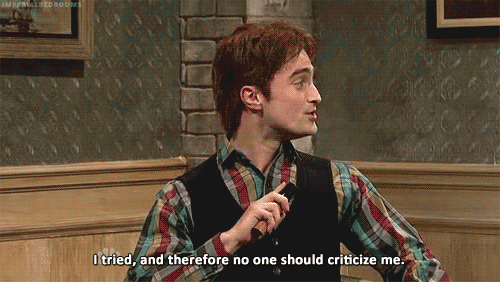So I definitely don’t fit any of the DSM criteria for autism, but I thought it might be interesting to go through @politeyeti’s 'alternative diagnostic criteria' and see what fits.
under a read more because this is going to be boring.
BOLD indicates hella yes, ITALIC means maybe idk, and STRIKETHROUGH means nope not at all. Anything in plain text was too difficult to decide about and therefore ignored / eh probably not.
A. Differences in perception (at least 3)
1. Sensory defensiveness (ie, complaints or avoidance of any of the following: loud noises or places, bright lights, textures (food or object/clothing), tastes, smells, touch)
I am a picky picky person, particularly about textures, but I also have things like ‘can’t eat anything cooked with bell peppers’ which may or may not count.
2. Sensory seeking (ie, stims or stimming behaviour such as rocking, flapping, finger flicking, hair twirling, spinning objects, etc or actively desiring any of the following: deep pressure or touch, vestibular sensation [swings, spinning in any context, etc], specific smells, tastes, or textures)
So apparently I stim all the time??? and other people don’t???
3. Auditory processing difficulties
IDK if this is an autistic trait exactly, but I cannot for the life of me listen to someone keep talking for very long without the words just going in one ear and out the other - not without crazy awful effort or my adderall, anyway. (And wasn’t that a relief and a sad moment both the day I started taking it and realized holy crap I can actually pay attention to someone saying more than a few sentences at a time…followed by holy crap how did I never push my doc on having me try this before.)
Sometimes, even on the meds, I’ll be looking at a person and having a conversation, and all of a sudden I realize I’ve missed the last six or seven words that they’ve said and now need to respond.
4. Unusual, awkward, or delayed motor skills, or asymmetry between gross and fine motor skills (ie, clumsy but with strong fine motor skills, good gross motor skills with poor hand-writing or table skills, strong skills in a special-interest related area but poor overall [such as an ability to manipulate small objects but poor handwriting])
Well, I am definitely clumsy, but my delayed fine motor skills when I was young had to do with being born a month early more than anything else, I think.
5. A reduced or lack of conscious awareness and/or use of allistic (not autistic) nonverbal behaviour and communication such as facial expression, gesture, and posture. This criterion should not exclude persons who have learnt to read or otherwise comprehend nonverbal behaviour by rote learning, particularly adults. Intentional learning to overcome an inherent difficulty in comprehension is supportive of this criterion. It should also not exclude persons who have been taught to use nonverbals to be less visibly different. In such cases, internal report of difficulty should take precedence over apparent behaviour.
I don’t think this really applies to me? Although granted I might not necessarily know. I seem to notice other people feeling down more than other folks do, but maybe it’s just that I’m the one who actually takes the time to check in with them?
B. Differences in cognition (at least 3, one of which must be 1 or 2)
1. Difficulty in beginning or ending (at least 1):
Perseverative thoughts or behaviours
um. well, I think they have more to do with my depression, but yep.
Needing prompts (visual, verbal, hand-over-hand, etc) to begin or finish a task
sometimes. I mean, it’s not that I couldn’t do it myself, I don’t think, but it makes it so much easier to just have that nudge from outside.
Difficulties planning complex activities
I’m not sure exactly what this means??? I’m not great at like, planning parties or whatever.
Catatonia
nope.
Difficulty switching between activities
sometimes?
Lack of apparent startle response
ahahahaha world of no.
Preference for sameness (same food, same clothes, same travel routes, etc)
2. Difficulty in using language (at least 1, not necessarily present at all times):
Problems with pronoun use that are developmentally inappropriate
uh. IDK if this counts but for a while when I was little ‘her’ was my all-purpose pronoun? but maybe I was just unconsciously fighting the patriarchy. :P
A reduced or lack of awareness of tone in self (ie, speaks in a monotone, childish, or otherwise unusual manner) and/or others (ie, does not perceive sarcasm or follow implied prompts, responds to rhetorical statements and questions in earnest)
so, most of the time, I have no problems with sarcasm or rhetorical questions (and I certainly use them a lot myself) or imprecise language, but every so often something just won’t click and I’ll respond very confusedly to something in a way that gets me yelled at for being a jerk because i ‘knew what they meant’ and I can’t really explain that right at that moment I hadn’t.
sometimes, too, I am 99% sure someone’s fucking with me because I tend to be gullible, but I have that tiny 1% of doubt and so I err on the side of taking the person at face value, because I’d rather look ridiculous for assuming they were telling the truth than look ridiculous for assuming they weren’t.
A reduced or lack of awareness of volume (ie, speaks too loud or too quietly for the situation)
okay I literally cannot tell a lot of the time how loud I am and have a horrible time deliberately modulating my volume. it drives my family nuts.
No functional language use (includes sign, PECS, spoken, written, and any other communicative language regardless of form)
*waves hello*
Echolalia
not moreso than most allistic people, I don’t think - I pick up words and phrases and syntax from people I hang out with, TV I see, etc., and sometimes I’ll repeat snatches of songs to myself under my breath over and over again, but nothing unusual. I don’t think.
Mutism in some or all situations
IDK if it counts as mutism but sometimes my mouth’s been shut for a long time and I just don’t want to open it again it feels wrong to open it and it’s heavy and shut and typing is so much better but reaction gifs are even better than typing - strangely, it’s also easier to blog a conversation that to IM it when I feel like this. if I do use IM I tend to do third-person *hates the world* *has dumb coworkers* *hopes you’re doing well* kind of things which are really weird.
Uses scripts instead of spontaneous language (these may also be delayed echolalic in nature)
not anymore so than most folks, I don’t think.
3. At least one special interest in a topic that is unusual for any combination of intensity (ie, does not want to learn/talk about anything else, collects all information about the topic) or subject matter (ie, unusual, obscure, or not considered age appropriate). Topics may be age appropriate and/or common (such as a popular television show or book), but the intensity of interest and/or specific behaviour (such as collecting or organising information as the primary focus) should be taken into account.
I’m going to go ahead and say yes to this and point at fandom.
4. Asymmetry of cognitive skills
???
5. Talents in any pattern recognition, including music, mathematics, specific language structures, puzzles, and art (any one meets this criterion, not all must be present)
I mean patterns aren’t that hard to recognize so I don’t really understand the question?
6. A tendency to focus on details instead of the broader picture, across contexts.
Depends on the thing. I like wide views of concepts etc. but sometimes I do get caught on little details I find interesting.
C. These differences cause impairment and/or distress in at least one context (ie, school, work, home), which may be variable over time. Impairment or distress may be defined variably, including meltdowns, anxiety, depression, a pervasive sense of not fitting in, and compulsive behaviours. It is necessary to remember that while the symptoms are not necessarily disabling in themselves, the social response to these symptoms can be disabling. The impairment or distress may be historical, with appropriate evidence to support this claim (ie, a documented history of meltdowns as a child, and only mild anxiety as an adult), as distress may decrease over time and with education.
Um. sometimes, I guess? I mean. meltdowns suck. Mostly it’s my depressive episodes that cause impairment and distress but like, choice paralysis is really annoying and the fact that I can so easily wind up having a meltdown over the stupidest of things is a real bother. and makes me feel like a petulant child.
D. Symptoms should be present in early childhood, but may not be noticeable until social demands outpace compensatory skills, at any age.
I mean I guess I’m me and I always have been??? I used to have a much harder time with a lot of these things, and my parents had a lot of difficulty raising me when I was really young because I was so different from them in terms of texture sensitivities, pickiness, distress caused by change, etc etc.
IDK?
via:Tumblr
http://ift.tt/1ibzMjy









